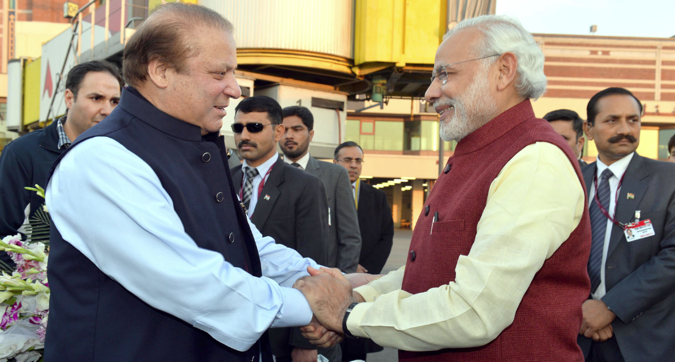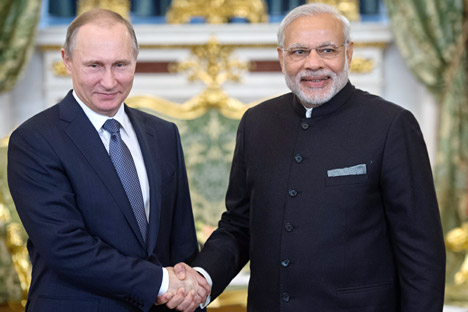Moscow to Delhi via Lahore: Modi’s foreign policy stunner

Indian Prime Minister Narendra Modi (R) being welcomed by the Prime Minister of Pakistan, Nawaz Sharif (L), at the airport in Lahore, Pakistan, 25 December 2015.
EPAIndian Prime Minister Narendra Modi has been criticised by political opponents for travelling abroad too often and not paying enough attention to domestic problems. But there was no criticism, only applause, when the final visit of 2015 was announced earlier this month by the Ministry of External Affairs (MEA), to Russia, seen across the country as India’s “trusted and time-tested” friend.
Modi’s visit to Moscow on December 23 and 24, part of the annual summit process between India and Russia, was intended to bring bilateral ties with Russia to the foreground again and see several major, exciting defence and other deals, including closer joint anti-terrorism collaboration.
The excitement of the first major defence deal under the ‘Make in India’ project, with Russia and India set to jointly produce 200 ‘Kamov’ (Ka-226T) light helicopters was all but forgotten when, on Christmas Day, Modi decided to return to Delhi from Moscow not only with an unannounced visit to Kabul but, for the first time ever by an Indian Prime Minister, “drop in” for an unscheduled visit to the Pakistani city of Lahore, to meet the Pakistani Prime Minister.
“Looking forward to meeting PM Nawaz Sharif in Lahore today afternoon, where I will drop by on my way back to Delhi,” tweeted Modi around noon on December 25, sending the Indian establishment into a frenzy of preparation and the media too stunned to know how to react. Modi tweeted his plan soon after tweeting that he had called to wish Sharif on his birthday. The Indian Prime Minister, who manages his own twitter handle @narendramodi, communicates primarily through tweets.
India’s Ambassador to Pakistan, TCA Raghavan, was actually taking a relaxed holiday in Islamabad when he received a call from the Indian Prime Minister’s secretary from Kabul (Modi flew from Moscow into Kabul to inaugurate the new Afghan Parliament building, which India has built at a cost of $90 million) informing him about the impending visit. Raghavan had to take a helicopter to cover the 370 km distance from the Pakistani capital, Islamabad, to Lahore to make it in time to receive Modi at the airport.
The Pakistani Prime Minister was in his residence at Raiwind just outside Lahore for his grand-daughter’s wedding celebrations and his own birthday. Sharif had apparently, sources told RIR, invited Modi to stop over for tea and the Indian Prime Minister just accepted the invitation.
Sharif personally came to the airport to receive his Indian counterpart, after which they both flew in the same helicopter to the Pakistan PM’s ancestral home. They met for a little less than two hours at Sharif’s festively lit home, and talked about improving ties.
“Beyond the noise, a personal connect. The Prime Ministers discuss India Pakistan relations,” tweeted Vikas Swarup, spokesman for India’s MEA. He added that Modi met Sharif at his home as “a special gesture” and blessed the latter’s granddaughter ahead of her wedding.
There are many sceptics who refuse to accept that an Indian Prime Minister can just “drop in” to see the Pakistani Prime Minister, without prior notice.
“Visits at that level require a great deal of preparation and ground work,” said Pinak Chakravarty, Distinguished Fellow at the Observer research Foundation and former Indian Ambassador. “It is unlikely to have just happened”, he opined.
Leaders in European countries drop in on each other, but not India and Pakistan, an analyst said.
“Preparations would have been kept a very closely guarded secret,” a senior government source said, “because of the huge security implications.” Also, the attempt was to move away from the huge expectations surrounding a regular summit meeting.
Asked if Modi may have apprised Putin about his plans, the source said it was “possible,” in a general way. But, given Modi’s sense of timing and theatre, it is unlikely he would have told Putin his exact plans. The Russian President has urged the Indian PM to re-open the stalled dialogue and peace process with Pakistan, as has the US President Barack Obama.
During their talks in Moscow, Modi and Putin spoke at great length on the issue of more effectively tackling terrorism, primarily in the context of the Islamic State in Syria and spreading its tentacles to Afghanistan, but also about Pakistan-sponsored terrorism and the need for New Delhi to engage with Islamabad.
Modi’s Pakistan policy and the dialogue process with Islamabad has been a difficult one, with more negatives and cancelled meetings than otherwise. Things appear to have changed around a month ago, when both Modi and Sharif met in Paris for the climate change summit and held a brief tete-a-tete. Both Presidents Putin and Obama were also in Paris at the time, for the gathering of heads of state.
After that meeting, the Indian and Pakistani National Security Advisors met in Bangkok for previously unannounced talks, followed by a visit by India’s External Affairs Minister Sushma Swaraj to Islamabad for the ‘Heart of Asia’ meeting. The foreign secretaries of both countries are due to meet in Islamabad in mid January, a government source confirmed, to re-start the formal dialogue process.
But all those meetings paled in comparison to Modi’s initiative to personally visit Sharif, at his family home, and talk away from official processes.
By actually “dropping in” for tea with the Pakistani PM, Modi put into action what his predecessor, former Prime Minister Manmohan Singh had sought.
Almost nine years ago, on January 8, 2007, Singh had expressed hope that India and Pakistan would enter into a treaty of peace, security and friendship and open borders.
"I dream of a day, while retaining our respective national identities, one can have breakfast in Amritsar, lunch in Lahore and dinner in Kabul,” said Singh, who was born in the village of Gah, now in Pakistan. “That is how my forefathers lived. That is how I want our grandchildren to live," said Singh, who could not visit Pakistan because of compulsions related mostly to terrorism emanating from Pakistan.
On Friday, Modi realised Singh’s dream, in reverse, when he flew from Moscow into Kabul in time for breakfast, then on Lahore for tea and back to New Delhi for dinner.
All rights reserved by Rossiyskaya Gazeta.
Subscribe
to our newsletter!
Get the week's best stories straight to your inbox
